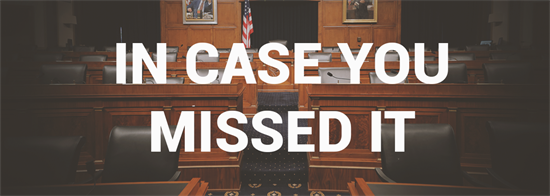ICYMI: Will the House’s “Must Haves” Make It Into Financial Reform?
Washington,
March 27, 2018
The Independent Community Bankers of America is very close to securing a victory for its members. Just one thing is keeping the Senate-passed Economic Growth, Regulatory Relief, and Consumer Protection Act (S.2155) from sailing to the White House for President Trump’s signature: The House of Representatives. Of course, this hold-up is not very odd. As millions of people learned via School House Rock, both chambers of Congress are supposed to have a say in what becomes U.S. law. But politics can take strange twists, and now a handful of senators and lobbyists are blaming conservatives—especially House Financial Services Chairman Jeb Hensarling (R-Texas)—for endangering financial regulatory reform. So just how unreasonable is Hensarling being? Is he trying to convince the Senate to take up reforms that would obviously fail to garner any Democratic support, such as repealing titles of Dodd-Frank? Far from it. Hensarling recently “laid out a list of roughly 30 House provisions with bipartisan backing” that he wants to include in the reform package. He explained his position this way: “Those bills that get bipartisan support [in the House], we expect to be in the final package. I don’t know any other way to put it.” His spokesperson added a bit of important context: “Chairman Hensarling offered to negotiate inclusion of House bills before the Senate bill was passed. That did not happen.” All provisions on Hensarling’s list garnered bipartisan support. A third of them passed either unanimously or by voice vote; they are about as far from controversial as possible. (Two were included in the recently passed omnibus spending bill). Here’s a sample from the House list:
There are many more bills with similarly strong bipartisan support in the House, so it only makes sense that the two chambers try to get as many of these improvements into law as possible. There are very different dynamics in the Senate, but that fact should not prevent a compromise on reforms with such overwhelming support in the House. The Senate bill passed the upper chamber with 67 votes. It would provide targeted exemptions from a few regulations for smaller banks. The bill is not nearly as comprehensive as the House bill passed in June, but nobody, least of all Chairman Hensarling, ever expected the Senate to make wholesale changes to the 2010 Dodd-Frank Act in this new bill. At the very least, Senate Democrats should go on record explaining why they oppose financial reforms that their House colleagues clearly want enacted. |



